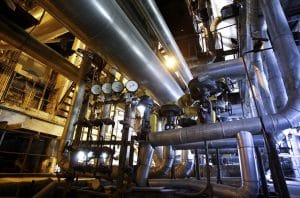 While heat exchangers and the advancement of thermal management have impacted virtually every modern industry, the field of manufacturing has seen some of the most significant benefits. Relying largely on technological solutions of all types, the importance of electrical cooling and other thermal management processes has always been significant to manufacturing companies. As heat exchangers began to simplify and streamline those processes, manufacturing companies were among the first to implement them and benefit from them on a wide scale. Today, manufacturing remains one of the most significant areas in which better thermal management processes have been beneficial.
While heat exchangers and the advancement of thermal management have impacted virtually every modern industry, the field of manufacturing has seen some of the most significant benefits. Relying largely on technological solutions of all types, the importance of electrical cooling and other thermal management processes has always been significant to manufacturing companies. As heat exchangers began to simplify and streamline those processes, manufacturing companies were among the first to implement them and benefit from them on a wide scale. Today, manufacturing remains one of the most significant areas in which better thermal management processes have been beneficial.
The history of thermal management in manufacturing
For many manufacturing companies of the past, thermal management was a much more cumbersome concern to deal with. The need to keep their electrical systems cooled was always vital, and the most commonly available solutions included methods such as HVAC techniques (air conditioning) and air compression units. Each solution’s goal is to generate chilled air that can then be used to keep temperatures inside of electrical enclosures low. The goal is achievable, but the equipment and large amounts of energy required to achieve it made such solutions cumbersome to maintain.
The innovation brought about through heat exchangers
When heat exchangers are responsible for electrical cooling, there’s no need for air chilling or air compressing methods to cool electrical enclosures. Instead, the innovative cooling units are designed to stop electrical waste heat from being able to cause damage in the first place. This involves using a cooling fluid to absorb the waste heat that electrical components generate, then transferring that heat to a heat sink where the fluid can release it. After the heat is released, the fluid flows back through the heat exchanger to continue absorbing more heat and transferring it. The heat transfer concept is less complicated than traditional cooling processes, but the largely self-contained system allows for advanced and more efficient electrical cooling.
How manufacturing companies continue to benefit
The fact that they make electrical cooling more energy and cost-efficient, while also boosting its productivity, is a major reason why manufacturing companies continue to rely on heat exchangers for their thermal management needs. Today, those needs have expanded as technology has taken over even more processes in the manufacturing realm. In everything from cooling modern electrical enclosures, such as control panels, to facilitating faster and more efficient processes such as wastewater treatment, the advent of heat exchangers has been critical to the advancement of modern manufacturing.
For more information about heat exchangers and their benefit to modern manufacturing methods, call Noren Thermal Solutions in Taylor, TX, at 866-936-6736.







